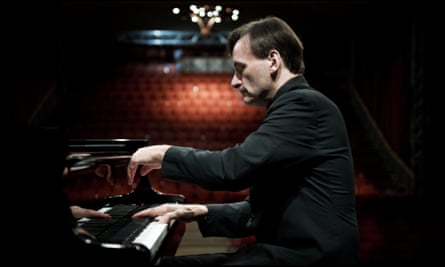Classical music was slow to join the streaming revolution, but the range of recordings available on the likes of Spotify and Apple Music has grown steadily year on year and today a large proportion of the recorded repertoire, including a huge amount of historic material, is accessible. But throughout this expansion, one British company, the fiercely independent Hyperion, with its distinctive back catalogue of outstanding recordings and performances, has been conspicuous in its absence. The label had always resolutely refused to allow its discs to be available on streaming services, insisting that the only model to make business sense was to sell physical CDs or allow them to be brought as digital downloads.
Four months ago, however, Hyperion was acquired by Universal Music and became part of a portfolio of labels that also includes Decca Classics and Deutsche Grammophon, both of which are widely streamed. It seemed only a matter of time before Hyperion would follow its stablemates into the fold, and indeed this week a start has been made on making the whole of the Hyperion catalogue available on all the regular streaming platforms.
Quality has got steadily better too – the recently launched Apple Classical is now offering lossless streams, so that even the most discerning audiophile should have few qualms about accessing their music in that way. Though for classical releases there are still some peripheral drawbacks – the unavailability of synopses and librettos for opera recordings perhaps the most obvious one – the advantages of now having virtually the whole of recorded history available in state-of-the-art sound within a few clicks are extraordinary, with the arrival of Hyperion’s catalogue filling one of the few significant remaining gaps.
It’s planned that by spring next year all of the more than 2000 albums that Hyperion has released since the late Ted Perry set up the company in 1980 will be streamable. For now, all new releases will be available immediately, while the initial batch to be made available from the back catalogue consists of 200 recordings that have been chosen to represent not only the range of the label, but also to showcase its most celebrated current artists. Further additions will be made fortnightly from mid September.
Among those now available is the recording that became one of Hyperion’s biggest commercial successes, A Feather on the Breath of God, the Gothic Voices’ disc of spiritual songs composed in the 12th century by Hildegard of Bingen, as well as Marc-André Hamelin’s recording of Morton Feldman’s 75-minute solo-piano For Bunita Marcus, composed in 1985.
These two recordings indicate the sheer historical span of what’s included, but it’s the outstanding recordings of mainstream recitals, chamber music and songs that one thinks of first in connection with Hyperion. Hamelin is just one of the unrivalled roster of pianists the label has assembled over the years, and most of them are accessible now. There’s Stephen Hough’s superb accounts of the complete piano concertos by Rachmaninov and Saint-Saëns, Steven Osborne’s Prokofiev piano sonatas and his unsurpassed version of Messiaen’s Vingt Regards sur l’Enfant-Jésus, very different but equally immaculate performances of Bach’s Goldberg Variations from both Angela Hewitt and Pavel Kolesnikov, as well as more Bach from Hewitt and a delicious compilation of Reynaldo Hahn from Kolesnikov.
Allow content provided by a third party?
This article includes content hosted on embed.music.apple.com. We ask for your permission before anything is loaded, as the provider may be using cookies and other technologies. To view this content, click ‘Allow and continue’.
Among the half dozen discs newly streamable by the Takács Quartet (exclusive Hyperion artists since the mid 2000s) are their superb Schubert and more recent Mendelssohn; there are discs from the cycle of Robert Simpson’s quartets that the Delmé Quartet recorded in the early 1990s, and it’s good also to have a sample of the much missed Florestan Trio, including their Schumann and Brahms piano trios.
Some of the most significant Hyperion projects have been in the field of 19th-century song. The complete Schubert Lieder edition, masterminded by pianist Graham Johnson, was an obvious choice for early release, though only four of the 40 volumes are available so far, together with a couple of issues in the Schumann edition that followed.
Allow content provided by a third party?
This article includes content hosted on embed.music.apple.com. We ask for your permission before anything is loaded, as the provider may be using cookies and other technologies. To view this content, click ‘Allow and continue’.
There are solo recital discs by Gerald Finley (including his version of Schumann’s Dichterliebe) and Carolyn Sampson (French baroque) too, and a wide range of the choral music – from Andrew Carwood’s Cardinall’s Musick and the Brabant Ensemble, among others – that is another of the label’s specialities.
There are relatively few orchestral discs in this first instalment of releases, though it’s good to see some of Vernon Handley’s recordings of British music there, including his discs of Granville Bantock, as well as Martyn Brabbins’s Vaughan Williams discs and Thierry Fischer’s outstanding version of Messiaen’s … des Canyons aux Étoiles… both released this year. More of all those conductors will surely follow shortly, but this first selection has enough treasures in all genres to be going on with.

